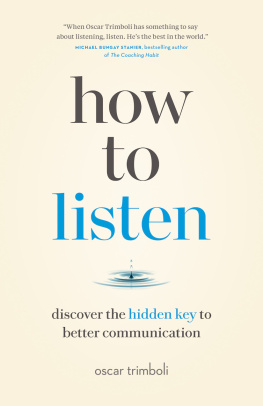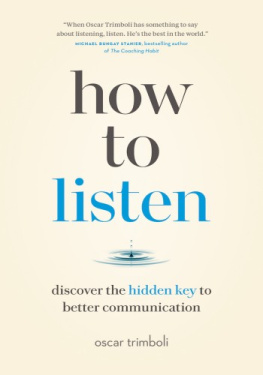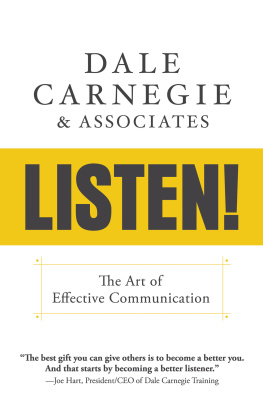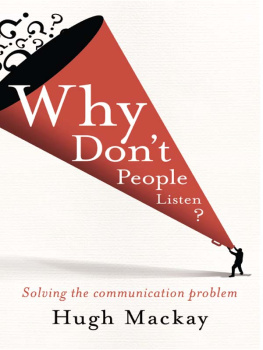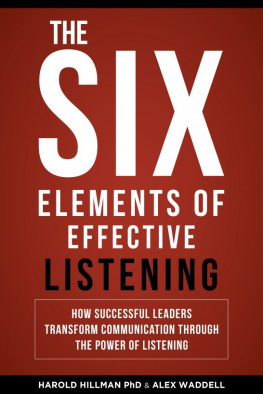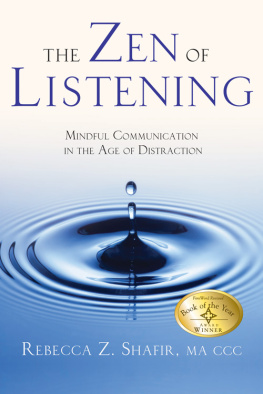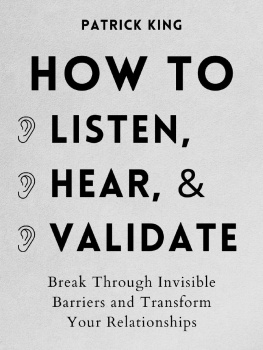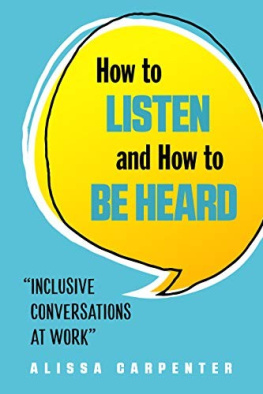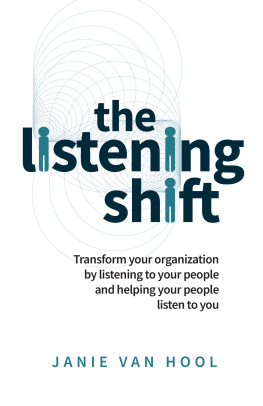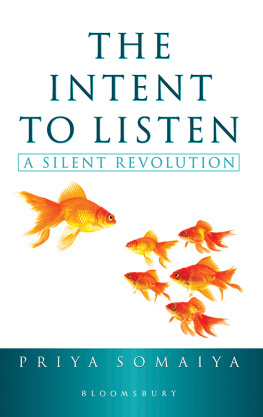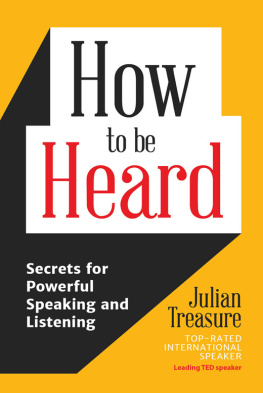Praise for
How to Listen
When Oscar Trimboli has something to say about listening, listen. Hes the best in the world.
Michael Bungay Stanier, bestselling author of The Coaching Habit and How to Begin
The most powerful leadership tool in my personal and professional life is the power of listeningtruly listening to create the most remarkable connection with my family, colleagues, customers, and community partners. How to Listen provides valuable insights into how we can strengthen our communication and improve our listening approach in a practical and meaningful way.
Naysla Edwards, vice president brand, charge cards, & member experience, American Express
A powerful way to reimagine leadership, this book made me realize how much more we can use listening to build high-performance workplace cultures.
Zoe Hayes, head of B2C marketing, consumer apps, & sport partnerships, AUNZ at Google
How to Listen is the missing piece in executive communications with practical and actionable tips to make us better listeners and, ultimately, better leaders. This book is a must for mastering communication skills in the twenty-first century.
Joanna Stephens Kramer, head of communications and public affairs, Johnson & Johnson MedTech
When it comes to designing a strategy, a campaign, or liberating an idea, the most overlooked step is listening. How to Listen is a timely reminder of the impact that listening has.
Nicole Taylor, senior vice president and head of LEGO Agency
Exploring a potent yet overlooked leadership competency, How to Listen is a pragmatic addition to an executive library.
Stephen Johnston, senior client partner, Korn Ferry
Oscar Trimboli amazed me by deconstructing how to listen into simple actionable concepts that help my ear see better.
Maria del Pilar Martin-Matos, medical director, Sanofi
An excellent book that provides practical tips and useful exercises to encourage a conscious effort to improve ones listening skills. Incredibly beneficial for leaders who work across different countries and cultures where there is a need to decode whats unspoken.
Stephane Asselin, chief executive, Asia, Aurecon
For a leader and executive, what is the cost of not listening? Trimboli brings to life the opportunity of listening with real stories that resonate alongside pragmatic insights and techniques to practice key skills. Learning how to listen has made the biggest impact on my team, organization, and career.
Kerri-Anne Loring, executive general manager, business service, Downer
How to Listen creates a pragmatic, professional, and powerful framework to hear what matters before its too late and very expensive. If you care about ROI , listening is your secret weapon.
Oscar Ledezma, global corporate development & M&A , The Clorox Company
I will return to How to Listen regularly, as I seek to improve and build upon my ability to truly listen. Give yourself the time to internalize Trimbolis valuable insights and the space to practice the helpful exercises and examples. A valuable resource for anyone looking to be a better listener.
Susan McMahon, CEO , TED xSydney
Finally a book that combines the art and science of listening in the workplace. It quickly helped me discover my listening barriers, and Im now a better leader for my team and customers.
Marc Monday, vice president, global strategic partnerships, Sage
How to Listen is the missing piece in the jigsaw puzzle of corporate communication. You can apply its potent and practical techniques immediately whether with the media, investors, or executive teams.
Susannah Clark, senior vice president, communications, Farfetch
For board directors, listening is perhaps the most essential skill. No matter how good your listening skills areand reading How to Listen will make you realize that your listening skills arent necessarily as good as you like to thinkTrimbolis insights and practical advice will take your listening to the next level.
Jennifer Lang, independent non-executive director and actuary
As a brand owner, listeningto your shoppers, your customers, your associates, and yourselfis critical for your future growth. Trimboli teaches you how to listen and most importantly how to act on these insights. Transformational!
Gina Head, brand director, Mars
By far, the best speakers are the best listeners. The definitive book on how to actually improve your listening, How to Listen is a fantastic resource to become a more effective leader. Trimboli breaks down what it takes to listen well, learn well, understand better, and empathize more. All critical skills at work and home.
Jon Yeo, head of curation, TED xMelbourne
Based on deep research, How to Listen is the lesson we all wish we had in school. Trimboli breaks down the process and allows you to digest it easily. This book could make you a better version of yourself. Buy one, and gift one.
Jane Huxley, chief executive officer, ARE Media
Becoming a great leader is not about you, its about them. Only when you know how to truly listen to them do you deserve the honor of leading them. This wonderful book will show you how.
Sherilyn Shackell, founder & global CEO , The Marketing Academy
your invitation
R ita is a busy professional with huge responsibilities at home and at work. As the chief operating officer of a publicly traded organization, she always has the monkey on her back, and people are constantly coming to her to solve their problems. Its absolutely exhausting.
She has received multiple awards from business magazines and womens leadership communities and has consistently been at the top of her profession and industry. But she finds leading in these times tough.
She is constantly asking: Why is coming to work every day like being put into a boxing ring blindfolded, with one arm tied behind my back and three people against me in the ring at the same time?
Based on the way she has led in the past, Rita thinks that more talking, more energy, and faster communication with others to solve their problems is her way out of back-to-back meetings. She doesnt realize that this Energizer Bunny approach to leadership has ceased to be effective and leaves her feeling drained and disappointed. And its starting to become evident to her manager.
Rita walks out of her annual performance review with her boss, completely flat with the feedback she has received. She was told that her focus was too far ahead of her peers and team. They feel rushed, interrupted, and like just another problem to be ticked off her list. She was told that she comes across as arrogant, close-minded, quick to judge, and too proud to admit she could be wrong or to acknowledge mistakes.
When she arrives for a team or individual discussion, Rita is physically present yet mentally distant. As a result, the others withdraw and tell her what she wants to hear, because they know she isnt listening. These miscommunications have cost her organization: late projects, defective products, billing errors, a spike in customer complaints, declining profitability, a regulatory investigation, and great employees unexpectedly leaving.
Her manager is clear and direct: Rita, you have ninety days to adjust your approach. If there is no change from you, then I will need to make the change.
After this meeting, Rita takes the fire stairs to the underground parking lot. She needs the space and time to process what her manager has just said. She had expected a different outcome from her annual performance review, and now she is struggling to make sense of the changes she needs to accomplish. Does she even have a future in this organization?

